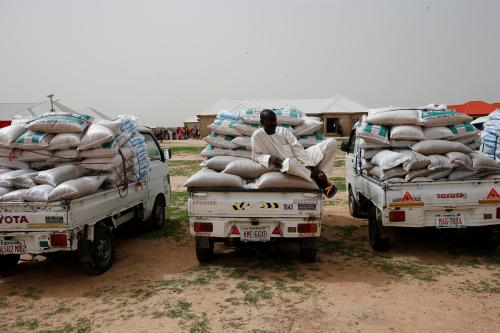The full version of this op-ed is available on Quartz Africa.
This May, the African Continental Free Trade Area (AfCFTA) came into force after its ratification by a sufficient number of African countries, marking a critical milestone in the Pan-African trade journey. The AfCFTA is predicted to boost the combined consumer and business spending and increase intra-African trade by at least 53.2%.
Trading under the AfCFTA framework is slated to start in July 2020. Yet recent developments suggest many African countries are worrisomely unprepared to implement their AfCFTA commitments when these go into effect.
In August, just three months after celebrating its signing the AfCFTA, Nigeria slapped a ban on the movement of all goods from countries with which it shares a land border: Benin, Niger and Cameroon, effectively banning all trade—import and export—with its neighbors. Nigerian officials have pointed to the primary objective of curbing smuggling of goods such as rice, tomatoes and poultry to bolster Nigeria’s agricultural sector. The border closure has impacted Nigerian consumers and exporters with traders being refused entry of goods, even those for which they have already paid customs duties, and consumers facing inflated prices of imported food products—with some products having doubled in price.
The biggest impact is felt by informal traders—most of them small and medium enterprises that operate along the Nigeria-Benin border. Nigeria’s high level of protection on products like rice has made smuggling from neighboring countries especially lucrative. The World Bank has estimated 80% of imports into Benin are destined for Nigeria.
Border closure on the African continent is nothing unusual. Earlier this year, Sudan closed its border with Libya and the Central African Republic, and Kenya suspended cross border trade with Somalia—both for security reasons. Rwanda briefly closed the border with the Democratic Republic of the Congo in response to Ebola outbreaks. However, Nigeria’s border closure differs from these earlier incidents, as it has been adopted to respond to trade-related concerns.
The closure of the Nigerian border goes against the spirit, and as of July 2020, the letter of the AfCFTA. Reflecting Agenda 2063, the AfCFTA aspires to “create a continental market with the free movement of persons, capital, goods and services”.
To accomplish this, AfCFTA members committed to disciplines on trade in goods, including commitments to refrain from quantity restrictions, (reciprocal) most-favored nation (MFN) status, and various annexes aimed at streamlining border-processes with rules on customs cooperation and mutual administrative assistance, trade facilitation, transit and transit facilitation, and non-tariff barriers.
By responding to a trade problem through unilateral border closure, Nigeria defies the provisions of the AfCFTA to which it committed only a few months ago.
But it’s not just AfCFTA, Nigeria’s recent border closure is also inconsistent with its 44-year long commitment to the Economic Community of West African States (ECOWAS)—West Africa’s Regional Economic Community which Nigeria spearheaded in 1975 and is one of the eight building blocks of the AfCFTA. Under the ECOWAS Protocol, member states committed to the establishment of a common market, including through “the liberalization of trade by abolition, among Member States, of customs duties levied on imports and exports, and the abolition, among Member States, of non-tariff barriers in order to establish a free trade area…”. Specifically, all 15 ECOWAS countries are committed to eliminating customs duties, quotas and quantity restrictions and accord each other most favored nation treatment.
And as a member of the World Trade Organization (WTO) since 1995, Nigeria is bound to comply with similar commitments at a multilateral level. Its most recent border closure is inconsistent with Nigeria’s key multilateral commitments.
Defying regional and international trade treaties, Nigeria’s border closure demonstrates the implementation gap that continues to exist between the texts of regional or international trade agreements, and the actual measures that some African governments adopt. It should be heeded as an early warning sign for the AfCFTA. To prevent the AfCFTA from entering the history books as yet another set of failed aspirations, it is imperative African leaders signal they are committed to implementing it, matching their words with concrete deeds to effectively affect intra-regional trade and development outcomes.
Keeping commitments
If African governments are really committed to AfCFTA’s success they’ll need to show the political will to resolve trade conflicts through dialogue rather than through unilateral trade restrictions. The African leaders who have not done so yet should change their mindset, embrace change, and show they actually believe in the potential of the continental market to contribute to shared prosperity over the long run.
African leaders must do better at showing the link between their commitments under international trade agreements – and most specifically, under the AfCFTA—and their responses to specific trade-related challenges. Doing so will signal awareness of the implications of commitments undertaken in the context of international treaties and help make the often incomprehensible provisions of a trade agreement seem more concrete. Governments shouldn’t wait for July 2020 to start acting in compliance with the AfCFTA. As noted earlier, the agreement doesn’t present governments with a set of entirely new obligations. Rather, it builds upon existing obligations and, to a large extent, mirrors the provisions of the WTO. Thus, governments are already bound to comply with a number of provisions relevant to trade liberalization, such as the MFN principle.
Moreover, the AfCFTA contains a number of trade-enabling provisions that could be used to respond to border smuggling, including provisions to strengthen customs cooperation and trade facilitation. Being serious about implementing these provisions would help curb the Nigeria-Benin smuggling problem.
African leaders should embody the AfCFTA in their industrialization and broader socio-economic development and governance, ensuring ownership at all the levels of governance, whether local, sub-national, national, sub-regional, or continental. Aligning with the AfCFTA, they should prioritize smart local and national strategies to enhance continental synergies and global competitiveness.
AfCFTA shouldn’t just be a reality for policy and business leaders, but also for all citizens, who should be educated and develop a culture of continental belonging and citizenry, learning about the importance, challenges, and benefits of continental integration and the AfCFTA.
Read more about Nigeria’s Benin border closure here.








Commentary
Op-edNigeria’s Benin border closure and what it means for the African Continental Free Trade Area (AfCFTA)
November 4, 2019